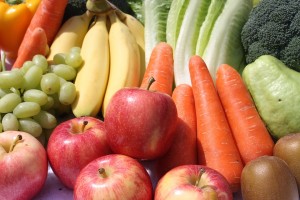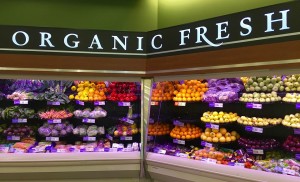
People often wonder what they should wash their fruits and vegetables with before consuming them. Some people only rinse them haphazardly, and some people neglect to wash them at all. Yes, you absolutely do need to wash them! We all want to enjoy summer and fall’s bounty, but must do so safely. It is unwise to take a chance and consume the pesticide residue and all the bacteria groups present on unwashed fruits and vegetables.1 Now we have COVID-19 added to the mix, which makes washing fresh produce even more crucial. People do get ill every year from food-borne bacteria (for various reasons),2 but please understand: the benefits of eating a lot of fruit and vegetables FAR outweigh any chance of food-borne illness, especially if you prepare your foods properly before eating them!
What’s On Fruits and Vegetables?
First, please realize that there is a happy medium here: not all bacteria on fruits and vegetables cause disease. Also, we NEED to come into contact with bacteria in order to keep our immune systems in good working order (which is why the use of anti-microbial hand washes in our homes is discouraged). If you are too clean, your immune system will eventually suffer.3
There are groups of differing bacteria on all our fruits and vegetables – most of which are harmless. However, do know that bacteria, viruses and parasites (which can differ according to farming practices and farm locations) can catch a ride on produce at any point en route from the farm to your table.4
Also, when fruits and vegetables begin to spoil, certain bacteria and fungi (some of which can be potentially hazardous to your health) begin to creep in.5 Many of us often complain that produce is “picked too soon,” but that actually does need to happen in order to keep it fresh if it’s going to be transported a long way. Domestic commercial agriculture does have a set of guidelines called Good Agricultural Practices (GAP) and Good Handling Practices (GHP)6 which are set in place in order to minimize fruit and vegetable food safety hazards.7
Occasionally, food-borne pathogens (disease-causing microorganisms) can be present such as: Escherichia coli (E. coli), Listeria, and Salmonella, but the majority of these pathogens are killed by agricultural anti-microbial washes before the produce gets to the grocery store.8
The bottom line is: because fresh produce is grown in soil, heavily fertilized with various substances, sprayed with pesticides and handled extensively during the harvesting, packing and displaying processes, washing your fruits and vegetables when you get them home is most definitely in order.
How Should I Handle and Wash Fresh Fruits & Vegetables?
- Wash your hands thoroughly.
- Cut away any bruised or damaged parts of the fruit/vegetable.
- If there are leaves, remove the outer leaves and discard them.
- Hold the fruit/vegetable under running water (extremely important)9
- Rub the fruit/vegetable with your hands (while holding it under cool, running water).
- Use a clean, designated fruit/vegetable brush to scrub the outside of produce with skins and rinds (yes, even scrub the rinds so that when you cut into it, the external bacteria do not transfer to the edible part of the fruit/veg via the knife).
- We use an organic grapefruit seed extract commercial spray wash (follow instructions on label). Some people use a mixture of baking soda (a few tablespoons) and vinegar (1 part vinegar to 3 parts water), or lemon juice. These ingredients cut through waxes (which are heavily present on apples and some other fruits) and other oily substances, and removes pests.
- Rinse fruit/vegetables thoroughly.
- Dry them with a paper towel (if not being prepared for cooking).
What About Pesticides? Should I Buy Organic Fruits and Vegetables?

You should try to buy organic fruits and vegetables when and if possible. There are some fruits and vegetables which hold more pesticides than others and/or have been treated with multiple pesticides. These highly pesticide-treated fruits/vegetables are often referred to as “The Dirty Dozen.” In other words, if you are trying to decide which fruits/vegetables you absolutely should buy organic, these are the ones.
The “Dirty Dozen” and Full List of Shopper’s Guide to Pesticides in Produce
The “Dirty Dozen” list (most pesticide-laden fruits and veggies) changes slightly every year. For 2021, the Environmental Working Group (EWG) has named the following 46 fruits/veggies the dirtiest (number 1 being the dirtiest, etc.); the first 12 are the most important to try to buy organic:
- Strawberries
- Spinach
- Kale, Collard, and Mustard Greens
- Nectarines
- Apples
- Grapes
- Cherries
- Peaches
- Pears
- Bell and Hot Peppers
- Celery
- Tomatoes
- Potatoes
- Cherry Tomatoes
- Lettuce
- Blueberries
- Cucumbers
- Plums
- Green Beans
- Tangerines
- Grapefruit
- Raspberries
- Snap Peas
- Oranges
- Carrots
- Winter Squashes
- Summer Squashes
- Bananas
- Sweet Potatoes
- Watermelon
- Mangoes
- Cantaloupe
- Honeydew
- Mushrooms
- Cauliflower
- Kiwi
- Cabbage
- Broccoli
- Asparagus
- Eggplant aka Aubergine
- Sweet peas (frozen)
- Papaya
- Onions
- Pineapple
- Sweet corn
- Avocadoes10
The “Dirty Dozen” fruits/vegetables (above) have all been analyzed for pesticides and have shown the highest amount of multiple residual pesticides.
Should I Wash Garden-Grown Vegetables?
There is no more satisfying feeling than growing your own vegetables and eating them! However, you should still wash them because they were grown in soil, fertilized with (?), pests have traversed them, dust and pollens have settled on them, and there are always communities of bacteria present.
In conclusion: work toward buying organic produce and/or growing your own. If you cannot grow your own and are only able to buy a few organic fruits and vegetables, try to buy the “Dirty Dozen” organic if you can. If you absolutely cannot buy organic produce or grow your own, please adhere stringently to the rules of handling and washing fruits and vegetables, and pay very close attention to the washing of the “Dirty Dozen.”

